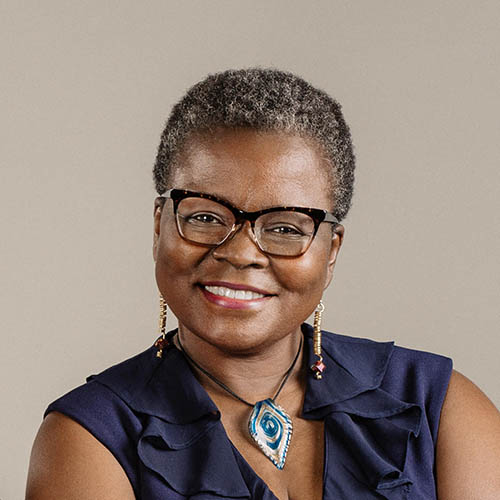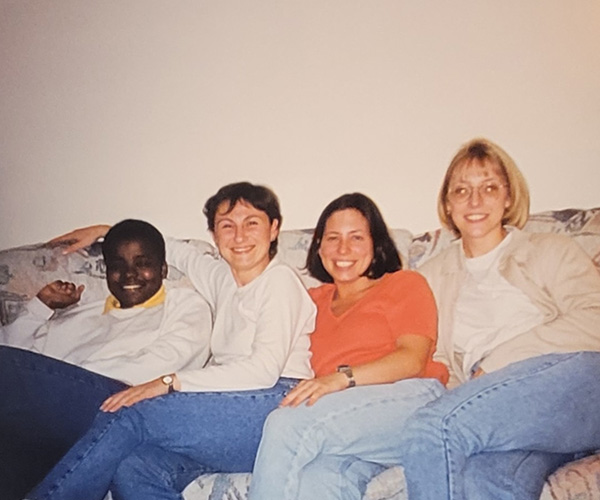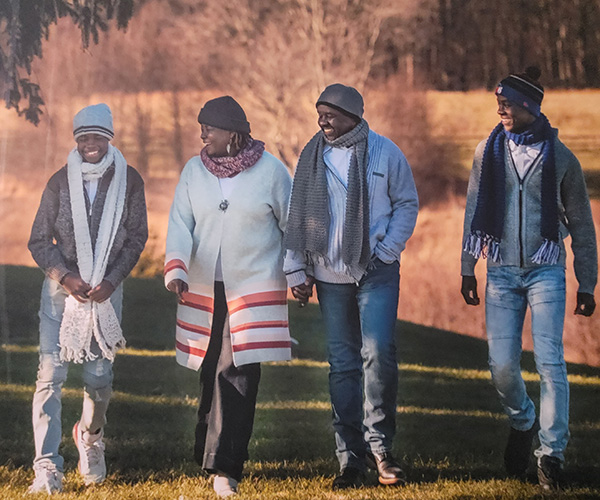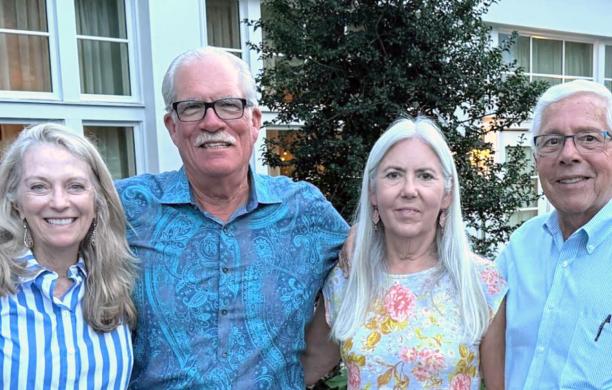
When Christine Martey-Ochola ’01G was 11 years old, her grandmother and aunties were speaking with her about her future. Martey-Ochola’s mother had just died from an infection contracted at the hospital where she served as one of the few obstetrician/gynecologists. The family of women surrounding Martey-Ochola at her home in Kenya saw in her the same passion, spirit, and drive that defined her mother’s days.
They asked what she planned to do with this one and precious life she had.
Her answer was clear: Build a university of science for girls.
That wild ambition is packed full of information – a deep self-knowledge, an entrepreneurial ambition, a commitment to education, a love of science, and a desire to address the inequity of women in science across the globe.
These ideas have become, in part, the lifework of a woman who excels in applying the laws of chemistry to the management of people, shifting of systems, and building of dreams.
Conditions Impact Matter
While Martey-Ochola was born in Kenya, her early years were set in the U.S.S.R., where her parents studied: her mother in medical school and her father in linguistics and diplomacy. So her first language was Russian.
When her parents finished their programs, they decided to return to Africa. Martey-Ochola's father was from Ghana, and unfortunately, political unrest had led to many targeted attacks on her father’s friends and colleagues. So the family settled in her mother’s homeland of Kenya.
No matter where they lived, the family instilled a clear directive: always improve the community you call home. So her parents encouraged civic engagement. Her mother had dedicated her life to the care of women and children, even in settings that lacked funding, supplies, and support. Her father was an academic and linguist and was a constant presence, encouraging Martey-Ochola to look beyond, read, and push herself to excel.
Martey-Ochola did just that. She first excelled in the pool, winning medals as a swimmer and qualifying for the All-Africa Games. While she passionately competed in the pool, she didn’t see swimming as a path to a better world.
Luckily, she also had pushed to attend college. Though the traditional path for girls finishing high school was marriage, she had aspirations for higher learning. She attended university in Kenya and earned a degree in food, science, and technology.
Although her early work in the food regulatory sector was engaging, she had a thirst for deeper knowledge in science and decided to continue her studies in the United States, where she had a one-way ticket that landed her in snowy East Stroudsburg, Pennsylvania, in January.
Reactions and Transformations
Cold. Darkness. A solitary K-Mart. Martey-Ochola felt a bit out of sorts. She had also been placed incorrectly into the culinary degree program.

Calling her father in hopes of escaping her surroundings yielded no sympathy. So she took herself over to the chemistry department, explained her circumstances, changed majors, and met an adviser, Diane Husic, who had recently traveled to Kenya. Soon Martey-Ochola was on a better path.
She landed in Eastern Pennsylvania because of other family members studying here. One in particular was the son of her mother’s best friend. Charles Ochola ‘98G ‘03G studied civil and environmental engineering at Lehigh. After she graduated from East Stroudsburg University, he prompted her to look at Lehigh for a graduate degree.
She had interned at Sanofi, working on the flu vaccine, and could imagine a career there, but she enjoyed learning and had an interest in expanding her research in biochemistry and pharmaceutical toxicology. Ultimately, Martey-Ochola chose to further her education and attend Lehigh thanks to Ned Heindel, Howard S. Bunn Emeritus Professor of Chemistry.
“He opened my brain in different ways and encouraged me to try new things,” she says. Heindel became a close friend and adviser. He helped her secure a spot in a research lab at Rutgers to advance the work she was most interested in while she completed coursework at Lehigh.
It helped as well that she and Ochola started dating while she was in graduate school.
“My time at Lehigh was deeply pivotal,” she says. “I loved teaching, research, and learning. Ned helped me gain so much confidence and find ways to belong.”
She recounts a trip they took to an American Chemical Society conference. She stood alone by her poster as one of a few Black women in attendance. Heindel saw that no one was coming to speak with her about his work. He walked off and returned in tow with some of the heavy hitters at the conference. He stood them in front of her and encouraged them to ask all the questions they had. They dove in. She responded. Soon others joined the swell, and Martey-Ochola felt like a peer.
Even more importantly, Heindel sat with her prior to graduation. He wanted to understand her future plans. Martey-Ochola was dreaming of a particular path: working in the Middle East to help women study STEM fields. She wanted to use her passion to help propel marginalized communities in new directions. Heindel thought she could make similar inroads here.
Beyond her professional dreams, Heindel also wondered about her personal goals. She imagined she’d marry and have a family.
After hearing it all, Heindel got to work, asking her more questions, posing ideas, and helping to shape a path.
Analyzing the Composition of Substances
Yes, she married her Lehigh sweetheart. Yes, they had two children. Yes, she taught and researched. First, it was a postdoc at the University of Rochester. Then a faculty role at Shippensburg. Then she joined Villanova, where her husband also worked.

Then a crisis in purpose struck her. Yes, she was doing great work and helping advocate for women in STEM. But she wasn’t feeling a direct impact in the way that she hoped. So she left her role and started the Sub-Saharan Chamber of Commerce to create bilateral relationships between the continents. She wanted to help female entrepreneurs expand their businesses, develop new markets, and shape emerging sectors.
Martey-Ochola understood the challenges directly. She had co-launched a business, Nuele, a clean beauty company for women who wanted to have healthy hair without the use of chemicals. That company leveraged her chemistry knowledge and sourced materials that supported women entrepreneurs who grew the wholesome ingredients.
Soon, though, she missed higher education and began to consult with Ellucian, where she assisted educational partners that needed strategic planning, program development, and faculty training. The bulk of the work was in STEM and at colleges with diverse populations.
“I’d serve as a bridge between what they wanted and how to get there,” she says. “I was in the business of chemistry, where people were my molecules, and I’d work to help those molecules grow and avoid unwanted reactions.”
As a consultant, she would help create success and slowly work herself out of a job.
That was until she found a role she didn’t want to give up.
Forming Bonds
Heindel would call and check in on her, still asking what she wanted to do when she grew up. This time, in one of their last conversations before his passing, he listened well as always and then said that she might have finally found the place where she belonged.
That role of Interim Dean of STEM at SUNY Broome Community College brought all of her passions together: program creation, economic development, diverse populations, and student success.
Heindel was right: She found where she belonged. Soon that consultant job turned into her new position.
As the assistant vice president and dean of STEM and workforce development at SUNY Broome Community College, Martey-Ochola is making an impact on campus and in the community, showcasing her skills as a chemist, woman in STEM, consultant, global citizen, academic administrator, and entrepreneur.
“It feels like I am really closing a loop, uniting all the strands of who I am and how I can work to improve our world,” she says.


